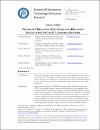Students’ Relative Attitudes and Relative Intentions to Use E-Learning Systems
Date
2022Metadata
Show full item recordAbstract
Aim/Purpose
This study, drawing on and extending research on the adoption of information technologies (IT), develops a research model to investigate: (1) the key relative factors that affect the adoption of e-learning versus using IT in traditional classrooms; and (2) students’ relative attitudes and relative intentions to use e-learning systems.
Background
Since the advent of the COVID-19 pandemic, higher education institutions (HEIs) have rapidly adopted e-learning and students are now engaging with e-learning systems. These systems present a new research opportunity for examining the relative efficacy of using e-learning systems versus using IT in traditional classrooms. Although prior research has examined various types of e-learning systems in different contexts and using various methodological approaches, evidence in the literature indicates that the relative efficacy of e-learning remains uncertain as little is known about the factors that affect the adoption and use of e-learning systems during COVID-19, as there is limited academic research.
Methodology
The model is tested based on the perceptions of a group of 569 students of the adoption of e-learning versus using IT in traditional classrooms in the United Arab Emirates. The data were analyzed with IBM SPSS statistics 26 and partial least squares structural equation modeling (PLS-SEM) implemented in SmartPLS 3 software.
Contribution
This research contributes to the literature by: (1) extending the UTAUT model to understand students’ relative attitudes and relative behavioral intentions towards using e-learning systems; (2) an extension to e-learning studies to examine relative factors affecting the adoption of e-learning systems by comparing the perceptions of the same group of students on e-learning and using IT in a traditional classroom environment in the context of COVID-19; and (3) providing valuable practical implications for HEIs to improve pedagogical approaches and e-learning systems.
Findings
The findings suggest that relative computer self-efficacy, relative cognitive absorption, relative system interactivity, and relative system functionality each positively influence both relative performance expectancy and relative effort expectancy, which in turn affect relative attitude; and that relative intention to use is positively affected by relative attitude and relative facilitating conditions.
Recommendations for Practitioners
Firstly, HEIs should feel more confident that e-learning systems indeed provide an appropriate learning approach, demonstrated by a high relative efficacy of e-learning systems perceived by the sample students in this study. Thus, it seems fitting for HEIs to use e-learning systems to enhance the development and delivery of programs and the quality of student experience, especially in the context of COVID-19. Secondly, HEIs wishing to use e-learning systems successfully should at least pay attention to a few key factors to ensure that students will have a positive attitude toward using e-learning systems. Such factors include students’ perceived usefulness of e-learning systems, developing encouraging facilitating conditions such as training, technical and IT support, thereby enabling students to use e-learning systems while enjoying their engagement with e-learning systems.
Recommendation for Researchers
First, this study shows that relative to using IT in a classroom environment, e-learning is favored by the students involved in this research. Second, this research indicates the value of examining relative antecedents and relative UTAUT related constructs, evaluating the relative perceptions of students, thereby understanding the relative efficacy of e-learning systems versus using IT in a traditional classroom environment in HEIs. Third, in addition to examining students’ perceptions of different learning approaches, or comparing the relative efficacy of different learning approaches based on the perceptions of different groups of students, the relative approach based on comparing the perceptions of the same group of students used in this research could offer a new way to advance our understanding of IT adoption. Finally, this study demonstrates that relative attitude, relative performance expectancy, and relative facilitating conditions are the top three vital factors that affect the adoption and use of e-learning systems during the COVID-19 crisis.
Impact on Society
The positive result of the students’ relative perceptions of e-learning systems suggests that private and public organizations, as well as education policy-makers in providing the learning process, could certainly use e-learning systems as a valuable means of training and/or education, especially during the COVID-19 pandemic.
Collections
- Law Research [296 items ]


